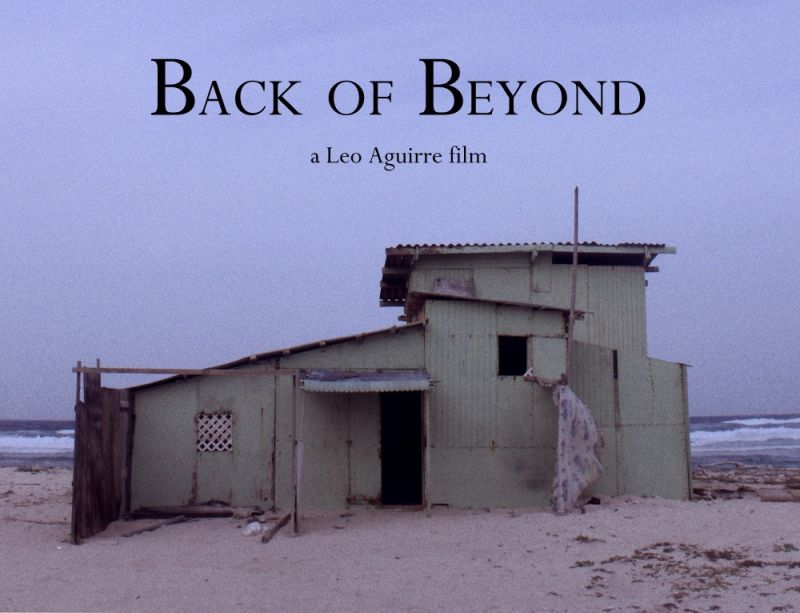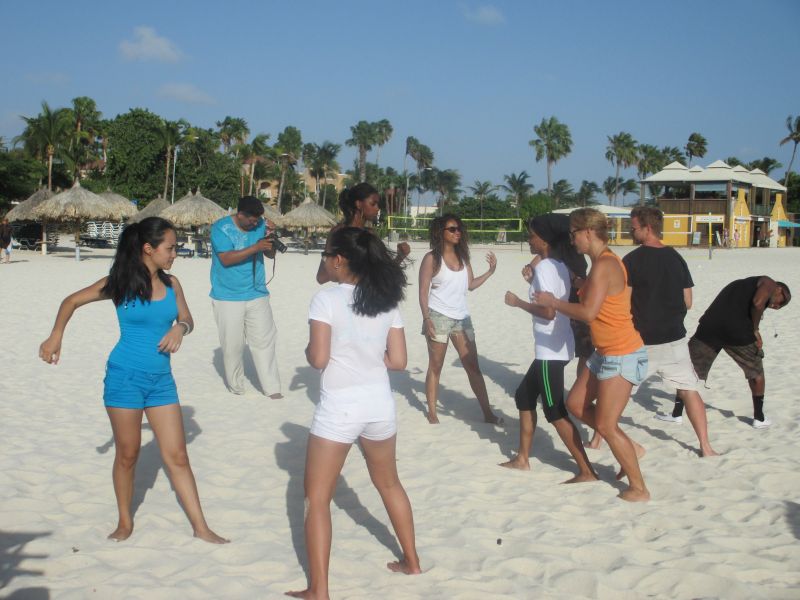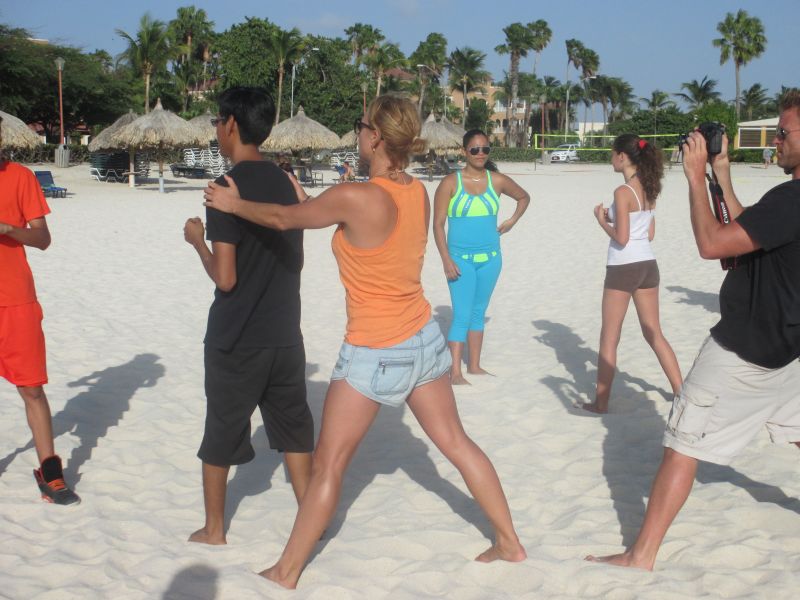|
|
||
|
Pro Tools
FILMFESTIVALS | 24/7 world wide coverageWelcome ! Enjoy the best of both worlds: Film & Festival News, exploring the best of the film festivals community. Launched in 1995, relentlessly connecting films to festivals, documenting and promoting festivals worldwide. Working on an upgrade soon. For collaboration, editorial contributions, or publicity, please send us an email here. User login |
Ciao Ciao Ciao, with Alessandro CalzaInterview with Alessandro Calza in Aruba at AIFF 2011. Alessandro Calza part wrote and starred in the film CIAO (2008), a love story about two lovers brought together from two different worlds through the internet, and through the loss of a mutual lover.
With Ale, I did a double up interview with Getty Images UK. I asked the questions and cameraman Chris rolled camera and recorded. We began the interview with Ale’s views on social systems in various countries before jumping in to talk about his film.
ME: Ciao, Ale… ALE: Ciao guys! ME: So, here you are in Aruba at AIFF 2! With your film ‘CIAO’. Can you till us a bit about your film? ALE: CIAO is a movie about two guys meeting online and developing a friendship that at a certain point becomes a feeling. That’s something that a comedy adds to people. But before they meet one of the guys dies. The Italian guy, my character, decides to go anyway to relive, revisit the person through his best friends. By being at his place or touching his objects or eating the stuff he used to eat. So, we were trying to do a few things all together with this story. ME: And can you tell us a bit about why you chose the word ‘ciao’? ALE: Well, ‘ciao’ is a strange word because it might mean ‘hi’ and ‘goodbye’ at the same time. It depends on how you move your body, which is very important in the way that Italians express themselves, you know, through body motion or gesture. So, if you are leaving, ‘ciao’ means goodbye. But if I’m coming with you, ‘ciao’ can mean ‘hi’. And I think this word was cool for the whole story because it’s a ‘goodbye’ but also a ‘hi’. There’s people meeting, people leaving, people getting to know each other but there is also the separation because of the loss and also because the story, the romance never happens. ME: And did the history of the word somehow influence the story? ALE: Yeah, it’s kind of strange. It’s an old word from Venezia area, Veneto, ‘ciao’ which means ‘I am your slave’, ‘I am at your service’. And then it became ‘ciao’. And it lost of course the deep meaning but it became a typical way. In that case, we have lost the formal meaning. Everybody knows what it means. Except I have a problem with people now because whenever I say ‘ciao’ to people they think I am promoting the movie, which I am not. ME: LOL. And yet another meaning to the word! ALE: Yeah, it seems like it. ME: So, you co-wrote this story? What inspired you to write it? ALE: Basically, the director Yen Tan is the writer and he wrote the script. But the part regarding my role I helped write the Italian parts. It’s very tricky to have an Italian or someone ethnic from anywhere with a very different intercultural presence without falling into stereotypes with my character. So, I did a lot of rewriting on that. I tried to give a language for my character which was plausible but at the same time not to disengaging for American audience because Americans a re very fussy when it comes to language. It’s not the pronunciation when it come to language but the sound of things. Most of the times when foreigners speak English Americans don’t understand so we were careful with that so it wouldn’t be disengaging. ME: So is it an American-Italian co-production? ALE: No, it’s totally an American production. But it’s kind of a fusion movie but it’s also with an Asian filmmaker. It is American with and Italian component. ME: How difficult was it to make this indie film in America and to find distribution? ALE: Very. We were very lucky because when we went to the festivals, the gay festivals, we got distribution straight away. And that’s very rare because many films don’t get it. But the production of the film was very hard. Some people get so much money to make a film and then the smaller films you fight over 1000 bucks. You can’t believe it and no one is interested in financing. ME: It’s easier to raise money for big blockbuster films but almost impossible for smaller films. ALE: Exactly. In America, the sense of spending is almost cultural. Spending creates a feeling in the average American. When they spend they feel reassured. If you can spend a lot, you feel it’s going to be fine. When buying things they spend the higher price because they think it’s better quality. In cinema, it works the same way. They say, ‘I have to make 100million so they spend 80million on the film and then many times this system doesn’t work and you have big flops while in the independent film area you can spend little and make a lot. Almost every season you have a movie that nobody expected to make money on. And nobody expected it. A big company will never give you the money. Still, the studio wants to invest in big budgets and not small budgets even if it would be economically viable. ME: How has your film been received so far? ALE: I think it’s a movie that is intended for a more mature audience. Probalby the target age is late 20s, 50s, 60s. To be engaged you don’t have to be gay because you can totally switch a character. It’s not about gay issues it’s about love, grief and loss. But because it’s about those issues, you need to be older to have that kind of experience, maybe love delusion or loss. Someone that dies in your family, etc. Every time people see the movie they tell me that they experienced something similar in their life and were touched by the film. The problem is the way people make movies… They big movies they try to entertain while the independent films try to give something to the viewer something more, in a much more honest way. In the way, it’s very adamant about this point. ME: Can you speak about your character? ALE: Since the character was so much like me, it was harder. It’s much easier to do something very different. When you are too close to home and you’re emotionally involved it’s much more difficult to control yourself and the acting that can be good at some level but at the same time it can be very dangerous because you don’t know if you’re acting how you should or just going on and on. ME: One more question.. last but not least… What is it like to habe your film screened here in Aruba during the 2nd annual Aruba Film Festival? ALE: It’s nice because it’s a small version of a very big festival. It’s just smaller but the vibe and the energy is like what you can see in a bigger festival. Even the big festivals they seem to be too jaded now. If you go to Berlin, you know, or Venezia, people are like ‘whatever!’ and they are almost bothered by this festival creating traffic, you know. Here in Aruba, an island about fun and nature, leisure, they are so thrilled this thing is coming in bringing a new layer to the island. ME: Well, hope you had fun here. ALE: Too much fun. Tonight is my last night in Aruba and I am very sad. Last night was crazy but great. When you don’t expect it, good things happen like that, totally spontaneous. At a certain point last night I thought I might end up in a hole without my body organs. You know, it happens. But you know… ME: LOL. Well, we’re not in Eastern Europe so I think you’ll be okay. Well, it could happen in London, right Chris? ALE: Yes, probably in London more than anywhere. They killed a gay guy in the middle of Trafalgar Square last year, like 3 girls. CHRIS: Really? Oh yeah. Yeah I remember that. ALE: British girls are dangerous. Either they are like Kate Moss or they are like hooligans. They are dangerous. ME: Well, Chris here is good. CHRIS: Yeah, the girls are crazy. The boys are good. Like me, I’m a good British boy. ALE: Drunk British girls they punch themselves. I’ve seen 20 girls having a fight in the tube. C’e… It was crazy. Once I was going to Peckham. It’s probably one of the ugliest places in the world. CHRIS: Yeah, it’s horrible. ALE: I mean, if you live in Peckham you can live in Calcutta. It’s just more beautiful. I was going there and a group of black girls attacked us. Because it was late mid 80s. We were dressed up and we were attacked by a group of girls. They were really rough. CHRIS: Yeah, it’s rough there. It’s better now but Peckham is still rough and horrible. ALE: Fat girls…drunk, in miniskirt without stockings in January with white stilettos. You know, but then you have the good girls. English is very classist in a way so if you’re in a good area you don’t see these bad areas. It’s so democratic because Italians are not all democratic. In Italy we pretend to be democratic. You have all these intellectuals who say to be open-minded but they live in rich neighborhoods and have the foreigners working for them. So, you have intellectuals and then foreign people who have escaped from bad lives and have not been educated and of course there is no real democracy in Italy. ME: Well, Aruba is a nice paradise from London, Italy and basically everywhere. What a place for a festival! Ale, thanks a million for this and for your film. Good luck and see you in Genova! We love your film!!! Ciao! ALE: CIAO, cara! CHRIS: Ciao! ALL OF US: CIAO!!!!
Interview written by Vanessa McMahon
see red carpet interview with Ale here: http://www.fest21.com/en/blog/aruba_international_film_festival/red_carp...
photos by Vanessa McMahon 20.06.2011 | Aruba International Film Festival's blog Cat. : Ale Alessandro Calza America Aruba Bella ciao Berlin Business Business Calcutta cameraman Ciao Ciao Ciao Ciao Contact Details Culture Director Eastern Europe energy English language Entertainment Entertainment Film Getty Images UK http://www.fest21.com/en/blog/aruba_international_film_festival/red_carp Human Interest Human Interest In cinema Italian language Italy Kate Moss London Peckham Person Career Person Location Technology Technology Trafalgar Square Vanessa McMahon Venetian language Veneto with Alessandro Calza writer Yen Tan Interviews
|
LinksThe Bulletin Board > The Bulletin Board Blog Following News Interview with IFTA Chairman (AFM)
Interview with Cannes Marche du Film Director
Filmfestivals.com dailies live coverage from > Live from India
Useful links for the indies: > Big files transfer
+ SUBSCRIBE to the weekly Newsletter Deals+ Special offers and discounts from filmfestivals.com Selected fun offers
> Bonus Casino
User imagesAbout Aruba International Film Festival Vieira Jonathan Vieira Jonathan The official Aruba International Film festival's blog View my profile Send me a message My festivalThe EditorUser contributions |



















.jpg)








